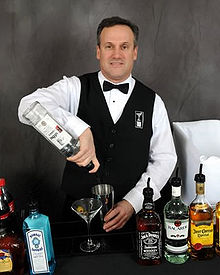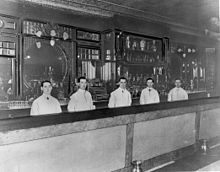- Bartender
-
A bartender is a person who serves beverages (usually alcoholic) behind a counter (or similar) in a bar, pub, tavern, or similar establishment. A bartender, in short, "tends the bar". The term barkeeper may carry a connotation of being the bar's owner. In addition to their core beverage-serving responsibility, bartenders usually maintain the supplies and inventory for the bar (though some establishments have barbacks who help with these duties). In establishments where cocktails are served, bartenders are expected to be able to mix hundreds to thousands of different drinks.[1]
Bartenders also usually serve as the public image of the bar they tend, contributing to as well as reflecting the atmosphere of the bar. In some establishments focused strictly on the food, this can mean the bartender is all but invisible. On the other extreme, some establishments make the bartender part of the entertainment, expected perhaps to engage in flair bartending or other forms of entertainment, such as those exemplified in the films Cocktail and Coyote Ugly. In regions where tipping is the norm, bartenders depend on tips for most of their income. Bartenders are also usually responsible for confirming that customers are of the legal drinking age before serving them alcohol. A major responsibility of a bartender is to make sure customers do not over-imbibe.
Contents
United Kingdom
In the United Kingdom, bar work is not generally regarded as a long-term profession, but more often as a second occupation, or transitional work for students to gain customer experience or to save money for university fees. As such, it lacks traditional employment protections and therefore has a high turnover.[2]
The high turnover of staff due to low wages and poor employee benefits results in a shortage of skilled bartenders. Whereas a career bartender would know drink recipes, serving techniques, alcohol contents, correct gas mixes, licensing law and often share cordial relationships with frequent customers (known as "regulars" in some parts of the world), short term staff lack these skill sets. Some pubs and bars prefer more experienced staff, although chains tend to accept inexperienced staff subsequent to in-house training.
United States
The Bureau of Labor Statistics maintains and publishes extensive data on occupations in the United States, including that of bartender. It publishes a detailed description of the bartender's typical duties[1] and employment and earning statistics by those so employed.[3]
References
- ^ a b U.S. Department of Labor, Bureau of Labor Statistics (January 2010). "Food and Beverage Serving and Related Workers". Occupational Outlook Handbook. Bulletin 2800 (2010-11 Library ed.). Washington, DC: U.S. Government Printing Office. p. 492. ISBN 9780160843181. http://www.bls.gov/oco/ocos162.htm. Retrieved April 25, 2010.
- ^ Lucas, Rosemary (2004). Employment relations in the hospitality and tourism industries. Routledge. pp. 27–42. ISBN 9780415297127. http://books.google.co.uk/books?id=PbFmohPo-38C. Retrieved 26 April 2010.
- ^ U.S. Department of Labor, Bureau of Labor Statistics (May 4, 2009). "35-3011 Bartenders". Occupational Employment and Wages, May 2008. http://www.bls.gov/oes/current/oes353011.htm. Retrieved April 26, 2010.
External links and further readings
- Bartender / Mixologist School & Career Guide
- What Do Bartenders Do What exactly is the definition of a bartender and how do they entertain us?
Bartending Occupations 
Tools Bar spoon · Beer engine · Blender · Chinoise · Cocktail shaker · Cocktail strainer · Corkscrew · Ice cube · Jigger · Juicer · Lemon zester · Margarita machine · Melon ball · Muddler · Muddling spoon · Nutmeg grater · Peg · Swizzle stick · WhiskGarnishes EdibleInedibleTerminology Categories:- Bartending
- Food services occupations
Wikimedia Foundation. 2010.





